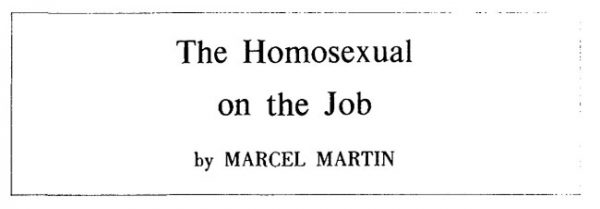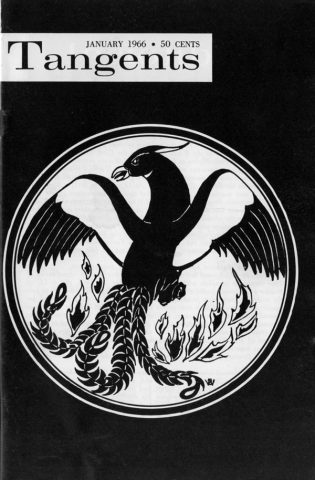The Homosexual on the Job
Tangents
January 1966
Vol. 1 No. 4
Essay by Ross Ingersoll as “Marcel Martin”
As originally printed in the January 1966 issue of Tangents pp. 4–8
In the December issue of Tangents I referred to the several worthwhile articles, which have appeared in the last few years in various respectable periodicals, on homosexuality; I mentioned in particular the article by Robert K. Woetzel entitled “Do Our Homosexuality Laws Make Sense?” which appeared in the Saturday Review of October 9, 1965. I stated that with this article, as a point of departure, I intended to point out what I think to be some of the most glaring inadequacies and inaccuracies of heterosexual reporting of the homosexual world of today. In doing so, together with what I hope may be some accurate reporting on homosexuality, I would like, primarily, to make self-evident the critical need for the expression of a literate and informed homosexual point of view.
 I should like to explain, at the outset, that I am not singling out Mr. Woetzel as being particularly objectionable. His article is but the latest of several I could use to prove my points. Furthermore, Mr. Woetzel raises a specific question as stated in the title of his article itself, and his particular answer to the question is admirable. We heartily agree with his conclusions and we have congratulated both Mr. Woetzel and the Saturday Review (see Tangents, November, 1965).
I should like to explain, at the outset, that I am not singling out Mr. Woetzel as being particularly objectionable. His article is but the latest of several I could use to prove my points. Furthermore, Mr. Woetzel raises a specific question as stated in the title of his article itself, and his particular answer to the question is admirable. We heartily agree with his conclusions and we have congratulated both Mr. Woetzel and the Saturday Review (see Tangents, November, 1965).
Why, then, am I unhappy with Mr. Woetzel’s article? Well, the fact is that I am unhappy, or less than happy, with almost every observation Mr. Woetzel makes about homosexuals and homosexual behavior—all of which he cites to prove his thesis—for the reason that he simply restates old cliches without presenting any direct evidence that his assertions are true. Mr. Woetzel’s aim may have been to help the homosexual, but I doubt that he is actually going to help very much by trudging, once again, through the same mucky ground as have many other, but less temperate, writers before him. The fact that Mr. Woetzel’s statements are couched in moderate and unimpassioned language disguises but does not alter the fact that he is expressing heterosexual prejudice as established fact.
Let us consider the following brief statement.
“Normal homosexuals are usually fearful of losing their jobs. Often they try to compensate for their lacks by advancing their careers, and they may benefit each other to the detriment of their non-homosexual colleagues.”
The very restraint in this statement gives it dignity and authority which are apt to impress a great many readers. I like the phrase “normal homosexuals,” but what does the author mean by it? I should like to think that he means homosexuals can be normal, but I’m afraid that this is not what he had in mind. Does he mean that any homosexual who is not fearful of losing his job is “abnormal”? This is rather a frightening thought! Think on it for a moment. Any homosexual who is secure in his job, secure in his own ability to produce, secure in himself, secure in his trust in society or in his belief in justice is “abnormal.” The statement is ridiculous. There are, to be sure, many homosexuals who are fearful of losing their jobs, but are they fearful only because they are homosexuals? Or may there he other reasons why they may be insecure?
I should like to make a statement of my own, equally sound and ponderous, and I invite Mr. Woetzel (or anyone else) to criticize it. “Many normal heterosexuals are fearful of losing their jobs.” I’ll wager that I can prove my statement, should I he called upon to do so, far more quickly that Mr. Woetzel can prove his. There is something wrong here. The two statements are, except for the subjects, identical, yet my statement is sure to appear banal and obvious; Mr. Woetzel’s statement is apt to appear as some kind of profound indictment of the nature of homosexuality—an indictment made by a sincere, understanding and tolerant expert in this field.
Let us go on to the next part of his statement. “Often they try to compensate for their lacks by advancing their careers.” What “lacks” is Mr. Woetzel talking about? He has not previously said anything about any “lacks;” he certainly has not established that there are any, but yet he managed to insinuate—and I am willing to accept that he did not consciously mean to do this—that every homosexual has “lacks” of some kind; I am forced, too, to assume that these “lacks” are not ordinarily to he found among heterosexuals. But, are there no heterosexuals who have “lacks”? Are there no heterosexuals who may try to compensate for defects in their personalities, lacunae in their education, or training, or background for a particular job by adopting some defense mechanism?

Next Mr. Woetzel says “they try to compensate for their lacks by advancing their careers.” Since when has “trying to advance one’s career” become something to be criticized? I’ve always been led to believe that the attempt to advance one’s career was synonymous with ambition, a part of the great American dream, the reason for our prosperity and progress. It is incredible that Mr. Woetzel should have failed to realize the literal meaning of this statement. Apparently normal heterosexuals do not try to advance their careers—and to do so would he in some way reprehensible—they simply fold their hands and wait for the advancement which must come their way as a just reward for being sexual conformists.
Mr. Woetzel then says “they may benefit each other.” Is helping one another one of the “lacks” Mr. Woetzel attributes to us? Is it a crime, a fault? Apparently once again I’ve been misled by my Sunday School teachers. Somewhere I garnered the impression that “helping one an other” was a part of Christian doctrine. Apparently it’s only Christian, or lawful, or admirable to help those who, by public referendum, are deemed worthy of help. The Jews have been helping one another for centuries, and the Negroes seem to be trying to do so today; this, if we take Mr. Woetzel literally, could be the root of all their troubles. If we apply the converse of this implied doctrine, then heterosexuals should not help one another either. Do you think that Mr. Woetzel would accept this?
Finally, the statement concludes with “to the detriment of their heterosexual colleagues.” This would lead us to believe that the basic dislike of heterosexuals for homosexuals is purely economic—the fear that a homosexual might fill a position that a heterosexual could or should fill.
And this leads us to the ultimate absurdity. Just who is in the majority, and who in the minority? If all the homosexuals in American were fully employed, how many heterosexuals would be displaced? Let us assume, for a moment, that the president of the largest corporation in America is a homosexual and that he decrees that his company will employ no one who is not a homosexual. There could he considerable job shifting, this I grant, but what would the end result be on the employment figures of the United States? For every homosexual who shifted to the great company, there would be a vacancy for some possibly nondescript heterosexual to fill elsewhere. Does business, industry, even government, really want this? I doubt it. If any large business, any government agency, would—or could—accurately assess the net result of firing all its homosexual employees at one time, before still others could take their places, I’m inclined to think that the question of sexuality as a condition of employment would end, once and forever.
Now, to digress from Mr. Woetzel’s article, let us consider whether any of his allegations are basically true. Do homosexuals hire, promote, and recommend only other homosexuals? I firmly believe and state that the answer is a positive and unmistakeable “no.” Yet, every heterosexual writer on homosexuality, every security and personnel officer (if these all be heterosexual) operate on the premise that this is true.
“Nepotism” is a centuries-old word and an even older practice. To hire, to appoint, to designate on the basis of family relationship, friendship, influence, without regard to qualification and ability seems to be inherent in human nature. Condemned by law and spirit it still is much in evidence. Today, to hire on the basis of family relationship is, in some institutions, strictly forbidden—which is not to say that it doesn’t operate—but money, political support, and friendship are the recognized bases of political appointments. Does anyone’s sexuality enter into this picture?
The Postmaster Generalship and the Attorney Generalship are two high posts, in this country, which are generally regarded as the benefices of those who either financially or energetically most support the winning candidate for the presidency. No one considers this even unusual, though many often deplore the results, but should there ever be a hint of a sexual attachment between the principals—assuming they were of the same sex—I rather imagine the outcry would be deafening.
But, finally, let us examine this whole question from the point of view of the homosexual himself. Do homosexuals in executive and influential positions really favor other homosexuals? Not if they are good executives and capable of holding the position in the first place. Strictly speaking there’s nothing wrong with appoint ing one’s friend, one’s brother, one’s wife, or one’s lover to a position if he is the one best qualified to hold that position. But, to appoint a homosexual to any job or position, menial or great, simply because the appointee is a homosexual, is, of course, not a condemnation of homosexuality, any more than it is of heterosexuality, but a condemnation of the executive’s own character or judgment.
Actually, I think, I’m sure, I’m positive, in contradiction to what Mr. Woetzel may imply and to the scores of heterosexual writers who have preceded him, that the facts are to the contrary.

At this point, while I do not want to appear to contradict my earlier statement that homosexuals are not necessarily “fearful” of losing their jobs, I would like to say that they are extremely conscious of their fortune in holding those jobs. It has been my observation and experience that the responsible homosexual executive is apt to lean over backward, perhaps to his own discredit, to avoid hiring anyone whom he knows to he or suspects of being homosexual. Mr. Woetzel’s own words, properly interpreted, should bear this out. If the homosexual is “fearful” of his job, is he going to risk that job by deliberately and knowingly surrounding himself with other homosexuals for whose behavior he may be called to account? I think not. If he is really concerned about his own job and his own status, then he has a big enough problem accommodating his job and his own personal life without having to worry about others over whose con duct and discretion he has no control. While, sometimes there’s safety in numbers, in this particular arena there’s apt to he greater safety in solitude. One or two homosexuals in normal distribution in an office of heterosexuals may or may not attract attention. A staff of nothing but homosexuals most inevitably will eventually arouse suspicion and criticism. No, the “fearful” homosexual does not seek security by this route.
I will not deny that the “abnormal” homosexual, the one who is absolutely secure, who has nothing to lose and knows it, may not occasionally be above trying to benefit someone of whom he is enamored—we would be less than human if this did not sometimes happen. But the idea that a big bosom, a shapely leg, and a not-too-great reluctance to be congenial sometimes compensate for the shortcomings of many a secretary is too standard a component of today’s humor (see Playboy, December, 1965, p. 122) for anyone to allow himself to think that sexuality is the exclusive preoccupation of the homosexual.
Then too, and I point this out reluctantly, there is considerable lack of solidarity among homosexuals. If homosexuals, as a group, do have a serious fault it is most certainly an unwillingness or reluctance to stick out their necks for one another or even to help each other when there could be no possible reason not to do so. Perhaps, in making this statement, I am being more severe than the heterosexual writer, but if I am, I am, at least, making a true and honest criticism. Heterosexuals, take heart! Whether it be through fear or inherent defect in the homosexual character, homosexuals do not deserve the one compliment you so unstintingly give them. They, of all God’s creatures, help each other the least. If this were not so there would he no need for this article.
The United States government has taken a lot of criticism in the last fifteen years for allegedly having harbored enormous numbers of homosexuals—all of whom are presumed to be incompetent employees and ipso facto security risks. The Department of State has suffered most particularly from this accusation and criticism. The implication has often been made, though few writers have ever dared do more than repeat the insinuations of previous writers, with no proof or evidence, that the State Department particularly was a seething mass of homosexuals. Was this ever true?
I state emphatically that it was not, and I wait for someone to contradict me. Certainly there were homosexuals in the department, and many have been exposed and fired. And, tragically, the department has purged itself of many of its most talented, most accomplished and loyal employees. There were, and are, homosexuals in every department in Washington as there are in every branch of government, every business or enterprise of any size, in every town, every city, every hamlet of the United States and the entire world.
But, did the Department of State ever have, does it have now, more than its share? I am sure it did, it still does, but not because, as has often been implied, of the tolerance of a certain former Secretary of State or the forbearance of Franklin D. Roosevelt, or the patronage of State Department officers, but simply because the kind of work the Department of State is engaged in appeals to the particular kind of mind which is the particular gift of many homosexuals.
I think, and state categorically, that to expel homosexuals from the Department of State, from the Armed Forces Intelligence services, from the CIA, is to deprive those agencies and departments of many of their very best personnel.
There are two kinds of diplomats and intelligence men. There is the hack who sits in his cubicle digesting information and the man who supplies the information. The hack can be, and is, anybody—provided his background is impeccable—no sex problems, no money problems, no family or family relationship problems, no vices—a good, dull eunuch is ideal for this position—and United States intelligence operations offer abundant evidence that this is just what we have. Then there is the undercover man—the one who supplies the unknown facts. What kind of person should he be? Well, if he is an employee of the United States government he too should he. Above all, a thorough going heterosexual; if he is a foreign national, the recipient of thousands of dollars of U.S. currency, he may very well be a very clever homosexual. Homosexuals, provided they don’t draw U.S. dollars in salary, make very good diplomats and very good intelligence men. Why shouldn’t they?
Both the diplomat and the intelligence man must be artists at being devious. The homosexual has practiced being devious—not because it is any more inherent in his nature than in that of any one else, hut because it has been necessary for survival—since adolescence. It stands to reason, therefore, that he is admirably equipped for the very career which our present attitudes and policies are most adamant in denying him.
Though I should he the last to want to set off another purge in our diplomatic and intelligence services, I state here and now, emphatically, that these are fields to which homosexuals are and will always he attracted. Let the government redouble its guards and its security procedures. The result will be to deny to many individuals a great and productive career, but, and even more important, it will deny this society, this country, the services of many who are best equipped to serve. Can we afford this simply because these persons do not automatically respond, in their groins, to the same stimuli, as do a given majority?
The above are but examples. The homosexual is, after all, and despite some desire to deny it, a member of the human race, and his abilities and limitations are exactly those of all men. If there are, here and there, fields in which his temperament and talents lead him to excel, why should not society rejoice in this and take advantage of these talents rather than condemn both the fields and the homosexual?


